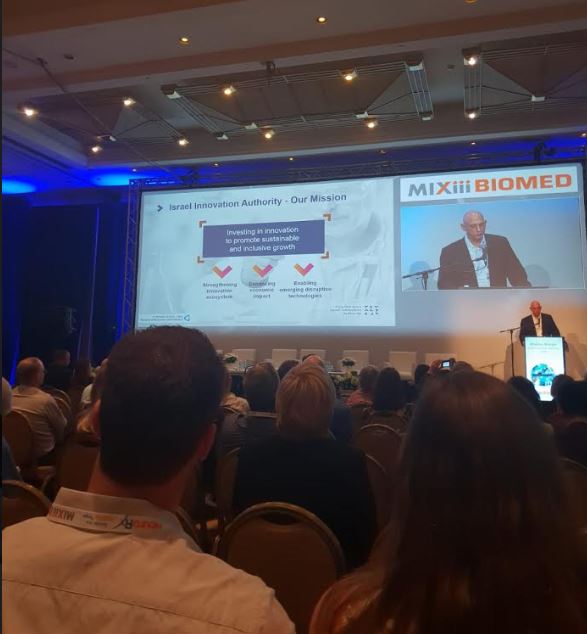Israel’s Mixiii-Biomed, the prestigious three-day life science and biomed conference now in its 17th year, attracted over 6,000 healthcare professionals, scientists, engineers, and investors from 45 countries this week, highlighting industry trends and looking at the future of the world’s digital health industry, as well as biotech and medical devices.
It was also an opportunity for the participants to experience Israel’s life science-focused tech and innovation firsthand as well as encourage Israeli academic institutions, research facilities, and health-and-science-focused startups to connect and collaborate with international health industry leaders. The event also featured an exhibition showcasing 45 startups developing medical devices, drug delivery systems, nanotechnology, and biomed and pharmaceutical products. The exhibition was sponsored by the Israel Innovation Authority, the support arm of the Israeli government in the national development of industrial R&D.
Among the 45 startups chosen, out of dozens, according to conference organizers, companies that generated conversation included Consis Medical, an “early-stage medical device company, devoted for the development of novel, single-use and self-propelled endoscopes,” Raziel Therapeutics, a Jerusalem-based startup that has developed a new localized injection that melts fat cells, and Bubble, a platform that eases menopausal symptoms in women like hot flashes and night sweats through an immersive virtual reality experience.
A panel of of judges, which included Israeli industry leaders like Dr. Ami Applebaum, chairman of the Israel Innovation Authority and chief scientist of the Israel Ministry of Economy, Anya Eldan, as well as vice president of the Israel Innovation Authority’s startup division, Karin Mayer Rubinstein, chose 10 of the companies for a startup competition, where they presented their concepts to the crowd and the panel of Israeli industry leaders.
The competing companies were Alpha Tau Medical, a solid cancer tumor treatment company, wearable brain sensor firm Neurosteer, eye-tracking device company NovaSight, blood count device maker PixCell Medical, MRI software company Brainvivo, artificial cornea developer CorNeat Vision, temperature stabilizer TempraMed Israel, motor restoration medical device company E-Motion Medical, eating behavior monitor Barimote, and microgravity services company SpacePharma.

Dr. Ami Appelbaum, chairman of the Israel Innovation Authority (l) and Dr. Irit Yaniv of Accelmed stand with winner Dr. Gilad Litvin chief medical Officer for CorNeat Vision. Photo via Alexander Elman
The judges chose PixCell Medical and CorNeat Vision were the winning companies, which Applebaum said “exemplify differentiated technology and solid global strategy, serving as a beacon of excellence for the well-being of humanity.”
Israel Innovation Authority CEO highlights Israel’s digital health plan
Aharon Aharon, the Israel Innovation Authority’s CEO opened the second day of the conference by presenting Israel’s prowess in healthcare and innovation as well as reaffirming the Israeli government’s commitment to promote digital health through a new initiative set to pour $275 million into the local digital healthcare industry.
The plan, approved by the Israeli cabinet, was first announced in March by Prime Minister Benjamin Netanyahu at the World Economic Forum Annual Meeting in Davos, Switzerland in January. Netanyahu said at the time that Israel would partner with multinational software company SAP over the next five years for a program to digitize the personal health records of Israeli citizens, and is designed to develop personalized and preventive medicine with the use of AI and machine learning tools for more tailored diagnoses and treatment.
Aharon said digital healthcare is now considered “the main growth engine of the Israeli economy,” and that Israel’s global leadership in information and communication technology (ICT) give it an edge to transform the industry in a groundbreaking way.
According to Aharon, the Israeli government is looking to contribute $15 million to health regulation, $70 million to encourage more R&D in the field, $10 million to human capital, and $180 million to health and research infrastructures. He emphasized the government-based incentives for Israeli researchers abroad to return to the country, as well as biotech and tech incubators, and other well-funded funded programs.
Aharon said that one reason Israel has an advantage in the digital health arena is that it holds electronic medical records for 98 percent of the population and gives researchers access to a wealth of usable data for R&D purposes. While this has raised some privacy concerns, the government believes its overall projects, which include the establishment of a national center for genetic screening, and advancing joint projects between the Israeli health system and world health systems, among other plans, will be beneficial.
Sign up for our free weekly newsletter
Subscribe
Aharon Aharon, CEO of the Israel Innovation Authority shares information on the Israeli life sciences industry. Courtesy
“This $275 million government initiative will further strengthen Israel’s leadership in the $6 trillion global digital health industry, leveraging Israel’s technological prowess in big data analytics, AI, and machine learning to develop efficient and personalized medicine,” he tells NoCamels in an email. “This change will shift the entire healthcare industry towards medicine that focuses on prevention and personalized cures.”
The Israel Innovation Authority, he says, “will leverage this government digital health initiative and ICT capabilities together with Israel’s local, world-renowned scientific research talent to bring anchor pharma companies to Israel and facilitate therapeutic and diagnostic capabilities.”
Aharon also praised the country’s “strong scientific capabilities,” pointing to Israel having more PhDs per capita than any other nation in the world, ranking 3rd in the world with intellectual properties (inventions, literary and artistic works; and symbols, names and images used in commerce) per capita, and with 33 percent of all Israeli scientists in the life sciences field.
Speakers highlight Israel’s digital healthcare innovation
The conference had a large number of international and local speakers whose talks, presentations, and panels were divided into nine tracks that focused on digital health, IoT, and big data in medicine; next-generation oncology treatments; brain health; personalized diagnostics and treatments; fighting rare genetic diseases using novel therapeutic approaches; nanomedicine and its role in new medical therapeutics; academic research to industry; cutting-edge medical device technologies; and novel clinical trial designs and technologies to accelerate drug development.
Many of these speakers, while highlighting their own research and company achievements, also referred to the incredible innovation coming out of Israel’s healthcare industry.
Bruce Rosengard, vice president of global external innovation and medical devices at US multinational pharma and packaged goods giant Johnson & Johnson made sure to commend Israel’s MedTech, saying, “There’s more innovation here in medical devices than anywhere on the planet.”
Israel’s digital healthcare industry had much to celebrate during the three-day event. Ahead of the conference, organizers released numbers about the industry which noted that the industry had a “compounded annual growth (CAGR) of 10 percent from 2008 to 2017.”
The 1,200 Israeli life science companies currently in existence raised a $1.2 billion in VC funds in 2017, with over 135 investment deals, according to the report, marking a whopping 41 percent increase compared to 2016. This was due in part to two significant exits — the acquisition of clinical-stage pharmaceutical company NeuroDerm by Mitsubishi Tanabe for $1.1 billion, and the acquisition of heart valve tech maker Valtech by Edwards Lifesciences for $1 million with an upfront payment of $340 million. In 2016, Israel raised $850 million in 137 deals.
The report also highlighted growing trends in the industry, which Aharon emphasized in his presentation, including big data, the influence of AI on medical diagnosis, personalized medicine and more.
Related posts

Israeli Medical Technologies That Could Change The World

Harnessing Our Own Bodies For Side Effect-Free Weight Loss

Missing Protein Could Unlock Treatment For Aggressive Lung Cancer





Facebook comments